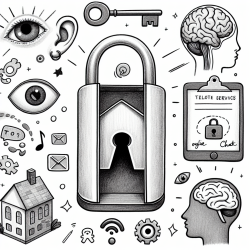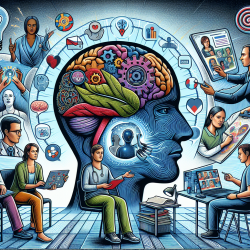Enhancing Diagnostic Skills: Lessons from the Undiagnosed Diseases Network International
In the realm of speech-language pathology, precise diagnosis is the cornerstone of effective intervention. The recent research article, "Equity in action: The Diagnostic Working Group of The Undiagnosed Diseases Network International," provides valuable insights that can significantly enhance diagnostic capabilities, particularly for practitioners dealing with rare and undiagnosed conditions.
The Challenge of Rare Disease Diagnosis
Rare diseases are a global public health priority, with over 300 million people affected worldwide. The journey to a diagnosis, often referred to as a 'diagnostic odyssey,' can be long and arduous, especially for families in underserved communities. The Undiagnosed Diseases Network International (UDNI) was established to address these challenges by fostering collaboration among clinicians, researchers, and patient organizations.
Key Insights from the UDNI
The UDNI's Diagnostic Working Group (DWG) aims to accelerate diagnoses, support knowledge sharing, and promote global medical discoveries. Here are some key takeaways for practitioners:
- Global Collaboration: The UDNI emphasizes the importance of international collaboration in shortening diagnostic timelines. Practitioners can benefit from engaging with global networks to share insights and resources.
- Advanced Diagnostic Techniques: The integration of cutting-edge 'omic' technologies, such as long-read and RNA sequencing, is crucial. Practitioners should stay informed about these advancements to enhance diagnostic accuracy.
- Cultural Sensitivity: Understanding socio-cultural barriers is vital. Practitioners should work with community leaders to ensure culturally appropriate care and improve patient engagement.
Implementing Research Outcomes
For practitioners, implementing the research outcomes from the UDNI involves:
- Continuous Education: Engaging in ongoing training to stay updated on the latest diagnostic tools and techniques.
- Data Sharing: Participating in data sharing initiatives to contribute to and benefit from global research efforts.
- Patient-Centered Care: Emphasizing patient-centered approaches that involve active listening and partnership with families.
Encouraging Further Research
The UDNI's work highlights the need for continued research and collaboration. Practitioners are encouraged to contribute to research efforts, particularly in understanding complex genomic variations and their implications for rare diseases.
To read the original research paper, please follow this link: Equity in action: The Diagnostic Working Group of The Undiagnosed Diseases Network International.










